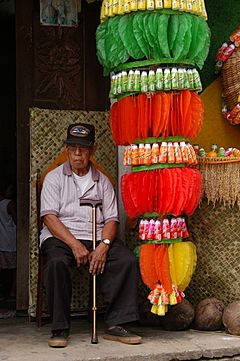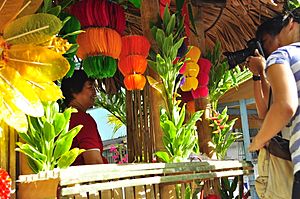Kiping facts for kids

An arangya, a lantern made from kiping wafers during the 2003 Pahiyas Festival of Lucban, Quezon
|
|
| Course | Dessert |
|---|---|
| Place of origin | Philippines |
| Main ingredients | glutinous rice |
Kiping is a special, leaf-shaped snack from the Philippines. It's made from a type of rice called glutinous rice. This yummy wafer comes from Lucban, a town in Quezon province. People celebrate Kiping every year during the exciting Pahiyas Festival. You can enjoy Kiping grilled or fried, often with a dip like sugar or vinegar.
Contents
What's in a Name?
The name kiping comes from the word kinipi. This means "pressed" in the local language. It describes how the dough is pressed to remove water when making Kiping.
How Kiping is Made
Kiping always has a unique leaf shape. This is because it's made using real leaves as molds! These leaves come from different plants. They must be safe to use and not change the taste of the Kiping.
Choosing the Right Leaves
The most popular leaves for Kiping come from the kabal tree (Fagraea racemosa). Other plants used include coffee trees, talisay (Terminalia catappa), cacao, antipolo (Artocarpus blancoi), and saba banana plants.
Mixing and Steaming
To make Kiping, people use glutinous rice. This rice is soaked in water for a few hours. Then, it's ground into a smooth paste. A little salt and different food colors are added to the paste.
Next, the colorful paste is spread thinly onto the chosen leaf molds. These are then steamed for about 30 minutes.
Drying and Storing
After steaming, the Kiping wafers are carefully taken off the leaves. They are air-dried in the shade. Then, they are stacked and pressed down with a weight for half a day. After this, they are separated and dried again. They are then pressed once more for another half day.
Traditionally, Kiping wafers are hung on strings to keep them safe. There's a fun old belief that everyone must be quiet while making Kiping. This is thought to stop the wafers from cracking!
How to Enjoy Kiping
Kiping is usually eaten grilled or fried until it's crispy. You can dip it in sweet sugar, tangy vinegar, or other yummy sauces.
Kiping as Decoration
Kiping is not just for eating! It's also used to make beautiful decorations. This is especially true during the Pahiyas Festival. People shape bundles of colorful Kiping into amazing chandeliers called arangya. They also create giant flowers and other pretty ornaments. These decorations are used to decorate houses, which are then judged during the festival.
Similar Snacks
Sometimes, the name Kiping is also used for a snack called kabkab. This is a similar wafer, but it's made from cassava instead of rice. Kabkab is found in other parts of the Philippines.
 | Dorothy Vaughan |
 | Charles Henry Turner |
 | Hildrus Poindexter |
 | Henry Cecil McBay |


